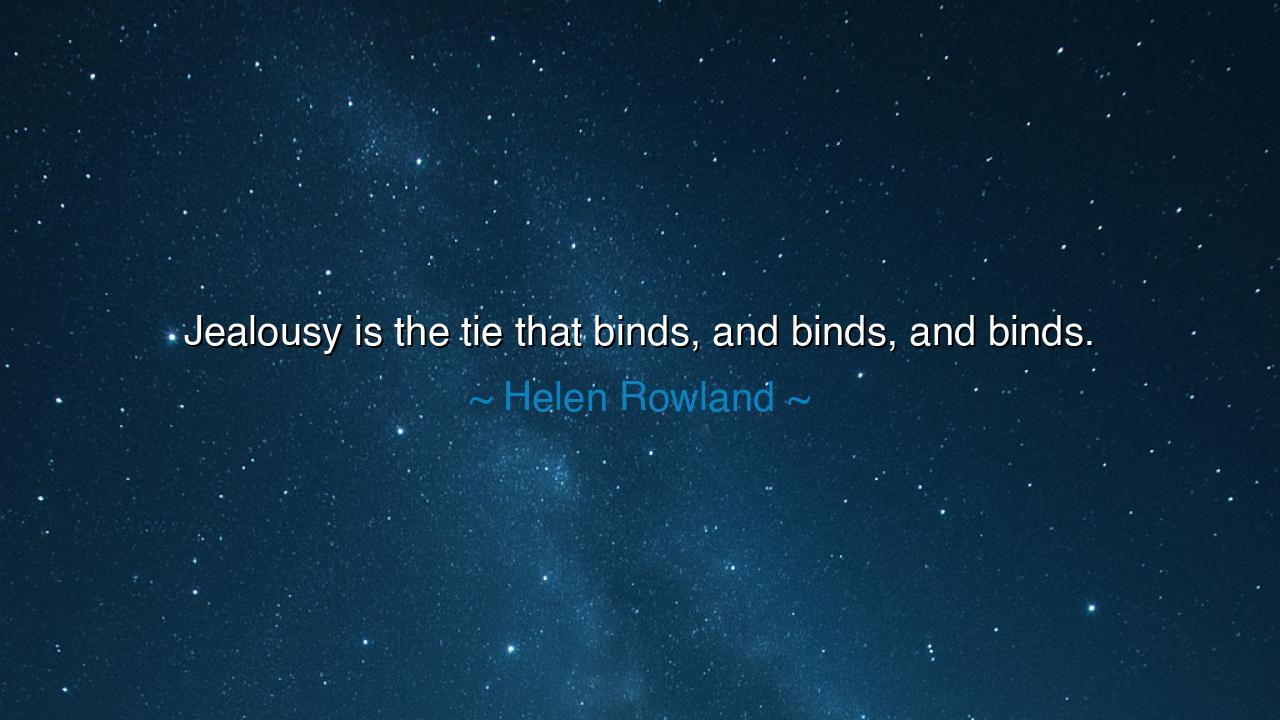
Jealousy is the tie that binds, and binds, and binds.






There are emotions that seem tender in their beginnings, yet become chains as they grow—and among these stands jealousy, the strangler of love. The wise and witty Helen Rowland, a keen observer of the human heart in the early 20th century, once wrote: “Jealousy is the tie that binds, and binds, and binds.” In these simple words, she captured a truth as old as passion itself—that jealousy, though it may seem to spring from love, soon transforms into a cord that tightens around both the lover and the beloved. What begins as a longing to protect affection becomes an obsession to possess it; what begins as devotion becomes imprisonment. Thus, jealousy is not a bond of love, but a binding of fear, repeating endlessly—it binds, and binds, and binds.
To understand the depth of Rowland’s words, one must first see her world. Helen Rowland lived in an age of great social change, when women were beginning to speak with their own voices about love, freedom, and the subtleties of human emotion. Her wit was her sword, and through it she dissected the illusions of romance. When she wrote of jealousy, she spoke not only of the jealous lover, but of the human tendency to clutch at what we fear to lose. In her time, as in ours, jealousy was mistaken for proof of love—yet she saw it for what it truly was: a chain forged by insecurity, tightened by suspicion, and polished by pride. Her quote is both lament and warning, reminding us that the tighter one holds, the faster love withers.
The tie that binds in love should be trust, tenderness, and shared respect. But when jealousy replaces these, it becomes a cruel imitation of intimacy. The jealous person does not love more deeply—they love more desperately. Their heart, consumed by fear of loss, begins to cage what it adores. And the tragedy is that in trying to hold love captive, they destroy its wings. Every accusation, every doubt, every anxious glance is another knot in the cord—it binds, and binds, and binds—until both hearts can no longer breathe. What was once affection becomes exhaustion, what was once warmth becomes suffocation. Love that is bound by jealousy dies of hunger for freedom.
History gives us a thousand mirrors of this truth, but none clearer than the tale of Othello and Desdemona. Shakespeare, like Rowland, understood jealousy as a binding force—a rope that strangles even the noblest soul. Othello loved Desdemona with all the fire of a warrior’s heart, but when jealousy entered, it coiled around his reason. With each whisper from Iago, Othello’s trust tightened into suspicion, his love twisted into torment. And in the end, he was not driven by hatred, but by that fatal illusion that jealousy creates—the belief that control is the same as devotion. He became both prisoner and executioner of his own heart. Thus, the “tie that binds” became the noose that ended love itself.
Helen Rowland’s insight is not merely about romance—it reaches into every corner of human relationship. Jealousy binds friends, families, and even nations. It is the seed of rivalry among siblings, the poison in politics, the destroyer of peace. When one cannot rejoice in another’s joy, when one measures worth only by comparison, the soul begins to shrink. The jealous spirit is never at rest, for it ties itself not only to others but also to its own torment. Every triumph of another becomes its own defeat, every smile of another its own sorrow. The jealous heart walks through life dragging invisible chains, forged by its own hands.
And yet, there is wisdom and redemption hidden within Rowland’s words. For if jealousy is the tie that binds, then awareness is the knife that cuts. The one who recognizes jealousy within himself has already loosened the cord. To free the heart, one must replace fear with trust, comparison with gratitude, and possession with presence. Love is not meant to bind but to unite; it grows not in control, but in confidence. The wise lover does not clutch, but cherishes; does not demand, but delights. Only in giving freedom do we keep what is truly ours.
The lesson of Rowland’s words, then, is timeless: that love without trust becomes bondage, and affection without freedom becomes decay. The jealous heart must learn that love cannot be owned—it can only be honored. If you would keep love alive, loosen your hold; if you would find peace, celebrate others rather than compete with them. When you feel the stir of jealousy, let it become a teacher rather than a tyrant—a reminder to cultivate faith and humility.
So let Helen Rowland’s truth echo across the ages: “Jealousy is the tie that binds, and binds, and binds.” It is a chain that tightens with every act of fear, every thought of possession, every breath of doubt. But love—true love—is not a binding, but a blessing. To love rightly is to let the beloved be free, and in that freedom, both hearts soar. Break the tie of jealousy, and you will find that love, once unbound, does not vanish—it grows stronger, purer, and eternal.






AAdministratorAdministrator
Welcome, honored guests. Please leave a comment, we will respond soon